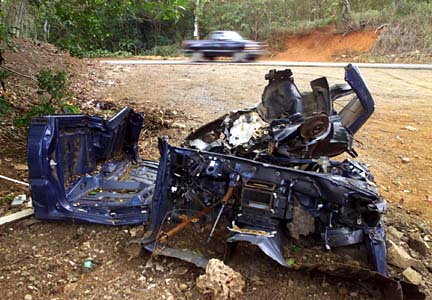

|
Kokua Line June Watanabe |
Coalition’s effort aims
to fight illegal dumpingQuestion: In a recent column, you noted which numbers to call for bulk pickup. But what about things left on the side of the road? There's a washer and dryer with graffiti on it that's dumped on Makiki Heights Road, just past the Hawaii Nature Center. Who should we call to have them removed?
Answer: Your question is timely in light of a public-private effort that began last month to deal with illegal dumping islandwide.
DENNIS ODA / DODA@STARBULLETIN.COM
Pieces of a junked car were left on the side of Kapaa Quarry Road yesterday, clearly visible from passing cars.
The city has set up a new Environmental Concern Line at 692-5656 for the public to report incidents of illegal dumping.
That's just one of the first steps in a move to pull together public agencies and private groups to address the problem of people tossing all kinds of trash and unwanted items every day onto Oahu's roadways, waters, and public and private properties.
The city also plans to launch a campaign to make the public more aware of the problem of illegal dumping and to provide them with a central number -- the Environmental Concern Line -- and a Web site -- www.opala.org -- to report environmental violations of any kind. The city would then determine what agency should respond.
The details on that are still being worked out.
Suzanne Jones, whose official position is recycling coordinator for the City and County of Honolulu, was asked to spearhead the anti-littering effort, which involved the creation of a Coalition to Stop Illegal Dumping and Littering.
Once she began looking into illegal dumping, she said she realized "It's not just one problem."
"It's a multitude of different problems that are all contributing to the eyesores that we see in areas around the island."
She noted many community groups have long volunteered their efforts at cleaning up the environment, only to be "frustrated time and again" that all the trash always came back, sometimes within weeks.
The coalition involves these community groups and government agencies, including the federal Environmental Protection Agency, the state Department of Health and the state Department of Land and Natural Resources -- agencies that are involved either with enforcing environmental laws or cleaning up the environment.
The idea behind the coalition was to coordinate efforts in cleanup, enforcement and community education and, thereby, to be more effective in controlling the problem, Jones said.
The immediate task facing the coalition, which has met twice so far, is to identify the "correct doing-the-right-thing behaviors that we want to see people doing" and figuring out what the barriers are to people doing them, Jones said.
Once those barriers are identified, "We might be able to better strategize and present programs and services and maybe even enforcement," she said.
With stepped-up enforcement, the hope is to catch and penalize the violators, so that "the public understands the seriousness of this activity" and be deterred from contributing to the environmental blight, she said.
Jones noted that the EPA already has sent two criminal enforcement agents to work on Oahu "to look at stepping up enforcement for these environmental crimes."
These agents have already met with the Attorney General's office and the Honolulu prosecutor's office "to smooth out the pathways for prosecution." They also have conducted training sessions with the Honolulu Police Department to help officers identify environmental crimes and know whom they should follow through with for investigation and prosecution, Jones said.
Meanwhile, the state Legislature and the City Council are considering legislation to strengthen enforcement activities.
"So there's a lot going on," Jones said.
Asked how serious illegal dumping is, she said, "Quantifying the problem is a challenge in and of itself."
Although there is anecdotal information about where the problem areas are and where the trash keeps coming back, there are no studies or data defining the problem, or analyzing why people litter, on which to base a plan of attack.
The city hopes to begin tracking all reports of illegal dumping through the Environmental Concern Line, putting all the information into a database.
For more information on the coalition, as well as how to properly dispose of all types of trash and goods, check www.opala.org.
Auwe
To an older (perhaps elderly) woman driver who caused an accident about 5:35 p.m. Sunday, Oct. 26, in Makiki. She drove from Hassinger Street to Pensacola Street. The teenager was walking with his bicycle and was ready to go into the crosswalk, when the woman's car hit the bike. The teenager fell to the ground. The woman hurriedly wrote something on a piece of paper, gave it to the teenager, picked up his bicycle, loaded it in the trunk of her car and told him she would have it fixed. She didn't even ask whether he was hurt and drove away. This woman didn't even call police to report this accident. We witnesses were shocked. -- No Name
|
See the Columnists section for some past articles.
Got a question or complaint?
Call 529-4773, fax 529-4750, or write to Kokua Line,
Honolulu Star-Bulletin, 500 Ala Moana Blvd., No. 7-210,
Honolulu 96813. As many as possible will be answered.
E-mail to kokualine@starbulletin.com
